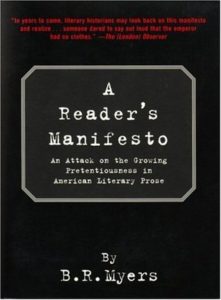
Previously: Flaubertian three-dimensionalism
Next: Waiting for Neuro
My favorite blog post for 2021 would have to be my review of B. R. Myers A Reader’s Manifesto, a book of literary criticism with a remarkable life: It started as a different book, was published as a two-part essay in The Atlantic, and then was published in book form yet again. (The history of its repeated rebirth is remarkable unto itself, and something I spend a little time digging into.)
Myers’ original 2001 essay sparked a debate over the state of American literature that was singular in my lifetime. His thesis was that American literature had grown pretentious, stunted, and dull. It’s wild to think there was a moment in recent American history when a good chunk of the public was discussing literature, contemporary or otherwise.
I did a bit of extra research for my post, digging into online newspaper and magazine archives to locate contemporaneous articles. (As I wrote, this was “a time when most people had their news delivered to them via bicycle.”) I also put the review through several extra editing cycles, in a lawyerly attempt to make certain everything on the page was either supported elsewhere or comported exactly to my personal viewpoint. There’s an admirable cleanness to Myers’ prose that I wanted to emulate.
As an example of Manifesto‘s continuing relevance twenty years later, here’s a paragraph from the acclaimed 2021 novel Leave the World Behind:
The store was frigid, brightly lit, wide-aisled. She bought yogurt and blueberries. She bought sliced turkey, whole-grain bread, that pebbly mud-colored mustard, and mayonnaise. She bought potato chips and tortilla chips and jarred salsa full of cilantro, even though Archie refused to eat cilantro. She bought organic hot dogs and inexpensive buns and the same ketchup everyone bought. She bought cold, hard lemons and seltzer and Tito’s vodka and two bottles of nine-dollar red wine. She bought dried spaghetti and salted butter and a head of garlic. She bought thick-cut bacon and a two-pound bag of flour and twelve-dollar maple syrup in a faceted glass bottle like a tacky perfume. She bought a pound of ground coffee, so potent she could smell it through the vacuum seal, and size 4 coffee filters made of recycled paper. If you care? She cared! She bought a three-pack of paper towels, and a spray-on sunscreen, and aloe, because the children had inherited their father’s pale skin. She bought those fancy crackers you put out when there were guests, and Ritz crackers, which everyone liked best, and crumbly white cheddar cheese and extra-garlicky hummus and an unsliced hard salami and those carrots that are tumbled around until they’re the size of a child’s fingers. She bought packages of cookies from Pepperidge Farm and three pints of Ben & Jerry’s politically virtuous ice cream and a Duncan Hines boxed mix for a yellow cake and a Duncan Hines tub of chocolate frosting with a red plastic lid, because parenthood had taught her that on a vacation’s inevitable rainy day you could while away an hour by baking a boxed cake. She bought two tumescent zucchini, a bag of snap peas, a bouquet of curling kale so green it was almost black. She bought a bottle of olive oil and a box of Entenmann’s crumb-topped doughnuts, a bunch of bananas and a bag of white nectarines and two plastic packages of strawberries, a dozen brown eggs, a plastic box of prewashed spinach, a plastic container of olives, some heirloom tomatoes wrapped in crinkling cellophane, marbled green and shocking orange. She bought three pounds of ground beef and two packages of hamburger buns, their bottoms dusty with flour, and a jar of locally made pickles. She bought four avocados and three limes and a sandy bundle of cilantro even though Archie refused to eat cilantro. It was more than two hundred dollars, but never mind.
If you skipped ahead, go back and read it again. After all, Leave the World Behind won over twenty “Book of the Year” awards.
Myers called out these “skim-friendly” lists as indicators of “a tale of Life in Consumerland, full of heavy irony, trite musing about advertising and materialism, and long, long lists of consumer artifacts, all dedicated to the proposition that America is a wasteland of stupefied shoppers.” He was speaking about White Noise back then. He could very well be speaking about Leave the World Behind today.
When I first read Manifesto in 2001, and again in 2021, my view was that Myers should be taken more seriously than some would have us believe. I remain convinced. Then and today, literary readers are pressed into accepting an author as a modern-day genius by dint of their credentials, their identity, their subject matter, or their elite supporters in the press. Myer’s Manifesto is more than a work of literary criticism, it’s a work of media criticism—he’s also taking aim at the literary gatekeepers and taste-makers perched in positions of cultural privilege.
In 2001, B. R. Myers asked an emperor-has-no-clothes question: Instead of rewarding authors because of who they are or who they know, why not judge their books by story, language, themes, and meanings? That question caused a big fuss back then. It turns out, it still can, if you ask it in the right company.
